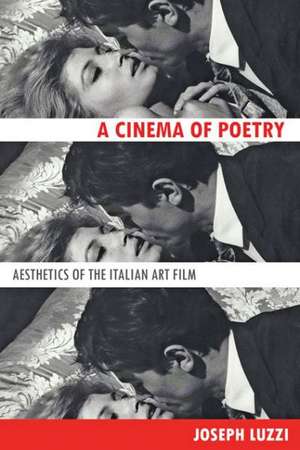A Cinema of Poetry – Aesthetics of the Italian Art Film
Autor Joseph Luzzien Limba Engleză Hardback – 10 iul 2014
The book balances theoretical inquiry with close readings of films by the masters of Italian cinema: Roberto Rossellini, Vittorio De Sica, Luchino Visconti, Michelangelo Antonioni, Federico Fellini, Pier Paolo Pasolini, Bernardo Bertolucci, and others. Luzzi's study is the first to show how Italian filmmakers address such crucial aesthetic issues as the nature of the chorus, the relation between symbol and allegory, the literary prehistory of montage, and the place of poetry in cinematic expression--what Pasolini called the cinema of poetry.
While Luzzi establishes how certain qualities of film--its link with technological processes, capacity for mass distribution, synthetic virtues (and vices) as the so-called total art--have reshaped centuries-long debates, A Cinema of Poetry also explores what is specific to the Italian art film and, more broadly, Italian cinematic history. In other words, what makes this version of the art film recognizably Italian?
Preț: 280.92 lei
Preț vechi: 358.03 lei
-22% Nou
Puncte Express: 421
Preț estimativ în valută:
53.76€ • 56.31$ • 44.55£
53.76€ • 56.31$ • 44.55£
Carte indisponibilă temporar
Doresc să fiu notificat când acest titlu va fi disponibil:
Se trimite...
Preluare comenzi: 021 569.72.76
Specificații
ISBN-13: 9781421411668
ISBN-10: 1421411660
Pagini: 232
Dimensiuni: 165 x 229 x 21 mm
Greutate: 0.46 kg
Ediția:New.
Editura: Johns Hopkins University Press
ISBN-10: 1421411660
Pagini: 232
Dimensiuni: 165 x 229 x 21 mm
Greutate: 0.46 kg
Ediția:New.
Editura: Johns Hopkins University Press
Textul de pe ultima copertă
A Cinema of Poetry brings Italian film studies into dialogue with fields outside its usual purview by showing how films can contribute to our understanding of aesthetic questions that stretch back to Homer. Joseph Luzzi considers the relation between film and literature, especially the cinematic adaptation of literary sources and, more generally, the fields of rhetoric, media studies, and modern Italian culture.
The book balances theoretical inquiry with close readings of films by the masters of Italian cinema: Roberto Rossellini, Vittorio De Sica, Luchino Visconti, Michelangelo Antonioni, Federico Fellini, Pier Paolo Pasolini, Bernardo Bertolucci, and others. Luzzi's study is the first to show how Italian filmmakers address such crucial aesthetic issues as the nature of the chorus, the relation between symbol and allegory, the literary prehistory of montage, and the place of poetry in cinematic expression--what Pasolini called the "cinema of poetry."
While Luzzi establishes how certain qualities of film--its link with technological processes, capacity for mass distribution, synthetic virtues (and vices) as the so-called total art--have reshaped centuries-long debates, A Cinema of Poetry also explores what is specific to the Italian art film and, more broadly, Italian cinematic history. In other words, what makes this version of the art film recognizably "Italian"?
"A thought-provoking and well-written investigation of the role of history and realism in Italian cinema and the role played by the centuries-long tradition of poetry (or more precisely, poesis) in this quest."--H-Italy
"Ambitious, inventive, learned... A Cinema of Poetry... brilliantly analyzes the art in the art film by showing how Italian cinema uses a chorus or expresses itself through allegory... This impressively intelligent re-description of the tradition surely takes its place alongside other necessary histories of Italian cinema."--Choice
Joseph Luzzi is a professor of comparative literature at Bard College. He is the author of Romantic Europe and the Ghost of Italy, which received the MLA's Scaglione Prize for Italian Studies; My Two Italies, a New York Times Book Review Editors' Choice; and In a Dark Wood: What Dante Taught Me about Grief, Healing, and the Mysteries of Love.
The book balances theoretical inquiry with close readings of films by the masters of Italian cinema: Roberto Rossellini, Vittorio De Sica, Luchino Visconti, Michelangelo Antonioni, Federico Fellini, Pier Paolo Pasolini, Bernardo Bertolucci, and others. Luzzi's study is the first to show how Italian filmmakers address such crucial aesthetic issues as the nature of the chorus, the relation between symbol and allegory, the literary prehistory of montage, and the place of poetry in cinematic expression--what Pasolini called the "cinema of poetry."
While Luzzi establishes how certain qualities of film--its link with technological processes, capacity for mass distribution, synthetic virtues (and vices) as the so-called total art--have reshaped centuries-long debates, A Cinema of Poetry also explores what is specific to the Italian art film and, more broadly, Italian cinematic history. In other words, what makes this version of the art film recognizably "Italian"?
"A thought-provoking and well-written investigation of the role of history and realism in Italian cinema and the role played by the centuries-long tradition of poetry (or more precisely, poesis) in this quest."--H-Italy
"Ambitious, inventive, learned... A Cinema of Poetry... brilliantly analyzes the art in the art film by showing how Italian cinema uses a chorus or expresses itself through allegory... This impressively intelligent re-description of the tradition surely takes its place alongside other necessary histories of Italian cinema."--Choice
Joseph Luzzi is a professor of comparative literature at Bard College. He is the author of Romantic Europe and the Ghost of Italy, which received the MLA's Scaglione Prize for Italian Studies; My Two Italies, a New York Times Book Review Editors' Choice; and In a Dark Wood: What Dante Taught Me about Grief, Healing, and the Mysteries of Love.
Notă biografică
Descriere
Brings Italian film studies into dialogue with fields outside its usual purview by showing how films can contribute to our understanding of aesthetic questions that stretch back to Homer.
